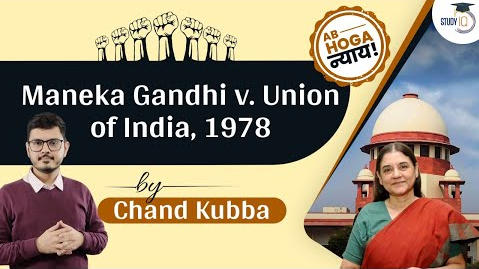Table of Contents
MANEKA GANDHI Vs. UNION OF INDIA
- Delivered by a 7-judge bench of the Hon’ble Supreme Court
- A landmark case which expanded the scope of Article 21 of the Constitution.
- Famously known as Maneka Gandhi’s caseor Personal liberty case.
- Prior to this case, Article 21 guaranteed the Right to Life and Personal Liberty only against the arbitrary action of the executive Only and not against the arbitrary legislative action.
- extended the protection against arbitrary legislative actions.
Facts of the Case
- Maneka Gandhi, a Journalist, was issued passport on 1st June 1976 under Passport Act .
- On 4th July 1977 she received a letter from regional passport office Delhi intimating to her that it was decided by the Government of India to impound her passport under section 10 (3)(c) off the act in public interest.
- She was required to surrender her passport within 7 days from the receipt of this letter.
- She immediately address the letter to regional passport officer requesting him to furnish a copy of the statement of the reasons for making the said order.
- MEAs reply stated that government decided ‘in interest of general public’ Not to furnish her copy of statement of reasons for the making of the order.
- Petitioner Gandhi thereupon filed the writ petition under Article 32, challenging the government order impounding her passport and declining to give reasons for doing so.
- She contending that the State’s Act was a direct assault on her Right of Personal Liberty as guaranteed by Article 21.
- She also cited Satwant Singh Sawhney v. Ramarathnam case wherein SC held that right to travel abroad is well within the ambit of Article 21.
- It was contended that Since right to go abroad is part of personal liberty within the meaning of article 21 and no one can be deprived of this right except according to the procedure established by law. There is no procedure prescribed by the passport act for impounding of passport.
- Even if some procedure can be traced in the said act it is unreasonable and arbitrary in as much as it does not provide for giving an opportunity to the holder of the passport to be heard against the making of order .
- The imposed order is made in contravention of the rules of natural justice.
- India might not have adopted the American concept of the “due process of law“, nevertheless, the procedure established by law should be fair and just, reasonable, and not be arbitrary.
Respondents contention
- Article 21 contains the phrase “procedure established by law” & such procedure does not have to pass the test of reasonability and need not necessarily be in consonance with the Articles 14 & 19.
Issues before the Court
- Is there a connection between the rights guaranteed under Articles 14, 19 and 21 of the Constitution of India?
What is scope of “Procedure established by Law”.
- Right to Travel Abroad comes Under Personal Liberty, Under Article 21-
- SC Referred to its earlier judgement in Satwant Singh vs Ramarathnam in which it was held that personal liberty also includes the right to locomotion and travel abroad
- Hence no person can be deprived of such rights except through the procedure established by law.
- Section 10 (3)(c) Empowers the state to seize the passport in the interest of sovereignty or integrity of the nation it’s friendly relations with foreign countries etc by recording in writing the reason for doing so and on demand furnish a copy of the same to the affected passport holder
- But central government never disclosed any reason for impounding the petitioners passport.
- The only explanation that she was given was that it was done in the interest of general public.
- Hence No Proper Procedure was Established.
- The fundamental rights conferred in Part 3 of the constitution are not distinctive nor mutually exclusive .
- Earlier in A.K Gopalan, it was held that FRs in themselves are mutually exclusive– was overruled
- Now it was held that there is a unique relationship between the provisions of Article 14, 19 & 21 and every law must pass the tests of the said provisions.
- Protection of life and personal liberty.—No person shall be deprived of his life or personal liberty except according to procedure established by law
- In simple term would mean that someones life or personal liberty can be taken away if the procedure established by law is in place.
- But for the first time in this case the court categorically stated that procedure established by law should be just fair reasonable and nonarbitrary – bringing it into the definition of due process of law
“Procedure established by Law”
- Means there should be some law which provides for the procedure of deprivation of life and personal liberty and if the executive follows that procedure then the curtailment of life and personal liberty is justified even if that procedure was not just fair and reasonable
“Due Process of Law”
- In the US constitution Due Process was added by the 8th amendment. In Indian constitution also it was proposed to be added but due to the experience in the US courts the framers of Indian constitution rejected that proposal.
- Reason- American courts had acquired immense powers in the garb of due process of law and were making excessive interference in legislative and executive actions of the state .
- So, our Constituent Assembly did not add ‘due process’ clause in Indian constitution, instead only procedure established by law was added in article 21.
- There is a clear infringement of basic ingredients of principles of natural justice that is Audi alteram partem.
Download | Free PDF






















 WhatsApp
WhatsApp